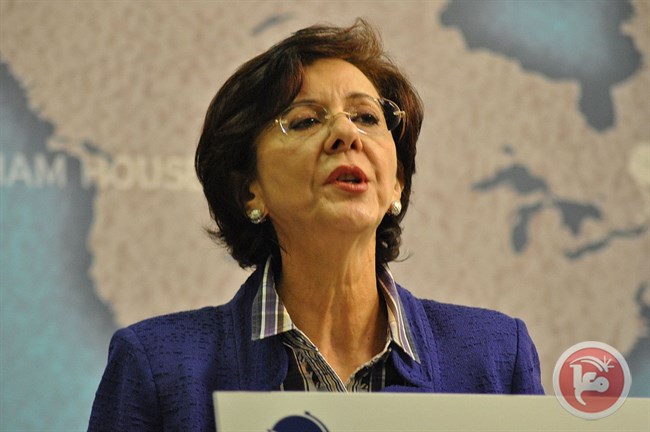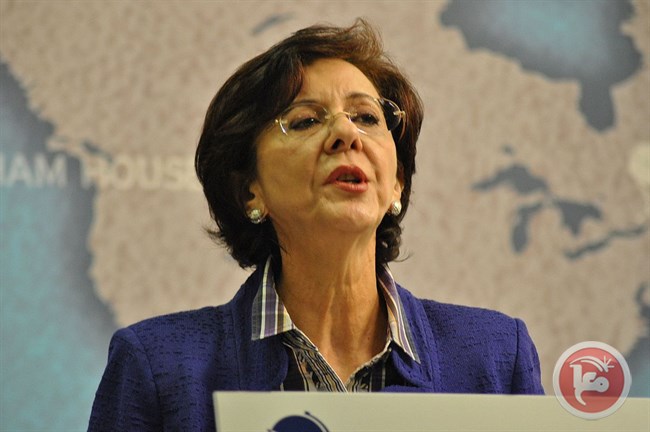Ma’an News Agency | – –
BETHLEHEM (Ma’an) — After the head of a United Nations agency resigned from her post, citing pressure from the UN Secretary-General to censor a new report that accused Israel of imposing an apartheid regime on Palestinians, Palestinian officials denounced the UN for removing the report.
Head of the UN Economic and Social Commission for Western Asia (ESCWA) Rima Khalaf resigned on Friday, telling reporters in Beirut that UN Secretary-General Antonio Guterres had insisted on the withdrawal of the damning report, which was no longer visible on ESCWA’s website on Friday.
Khalaf stood by the report, calling it the “first of its kind” from a UN agency that sheds light on “the crimes that Israel continues to commit against the Palestinian people, which amount to war crimes against humanity.”
ESCWA, which is comprised of 18 Arab states, said in the report that Israel was guilty “beyond a reasonable doubt” of imposing apartheid policies against Palestinians.
Israeli officials were quick to denounce it, comparing it to Nazi propaganda and calling for Guterres to publicly reject it.
Palestinian Liberation Organization (PLO) Executive Committee member Hanan Ashrawi condemned the decision by the UN to remove report in a written statement published Saturday,.
“Instead of succumbing to political blackmail or allowing itself to be censured or intimidated by external parties, the UN should condemn the acts described in the report and hold Israel responsible,” she said.
The PLO official lauded the report as “a step in the right direction” that she said “highlights the true reality on the ground which is one of apartheid, ethnic cleansing, and military occupation.”
Ashrawi called on Guterres “to do what is right, reinstate the ESCWA report and undertake serious and concrete measures to hold Israel accountable for its persistent violations of international law and human rights.”
Palestinian Minister of Foreign Affairs Riyad al-Maliki for his part reacted with “deep regret” that Khalaf was compelled to resign and expressed his “unequivocal objection” to the withdrawal of the report, which he described as an “objective analysis of the facts on the ground, arriving at an accurate conclusion based on the legal definition of the crime of apartheid.”
Al-Maliki also noted that UN spokesperson Stephane Dujarric’s comments defending the report’s withdrawal did not take issue with the content of the report itself, but rather with the fact that it had allegedly been published without consultation with the UN secretariat.
“Despite the procedural differences and, as the content and veracity of the report’s conclusions are not being debated, Palestine considers the withdrawal to be counterproductive and ill-advised,” the ministry said.
The statement went on to argue that the report’s removal “sends a dangerous message to countries that commit crimes; that with enough pressure, their actions can be ignored and appeased and that even reporting in this regard will be censored, as opposed to triggering serious consideration of the situation and of potential remedies, including accountability as per international law.”
“This has far-reaching negative consequences for the international system as we know it,” he urged.
Both Ashrawi and al-Maliki expressed their gratitude for Khalaf. Ashrawi said that the UN Secretary-General should have never accepted Khalaf’s resignation, affirming that the PLO “will continue to remain grateful to Dr. Khalaf for assuming a principled and courageous stand on behalf of the people of Palestine.”
Al-Maliki described Khalaf as “an outstanding international civil servant, whose expertise and integrity are beyond reproach and admired by all privileged to work with her, and her leadership and contribution to the advancement of societies across the West Asia region and beyond are fully recognized and commended.”
He concluded his statement by saying: “Trying to scrap the report will not scrap the reality it describes.”
Palestinians, activists, and a number of intellectuals have increasingly compared Israel’s occupation of the Palestinian territory with an apartheid system over the years, and sought to use similar tactics as those that took down the apartheid regime in South Africa.
The Boycott, Divestment, and Sanctions (BDS) movement founded in 2005 as a peaceful movement to restore Palestinian rights in accordance with international law has been largely influenced by the Sout[h African example].




 © 2025 All Rights Reserved
© 2025 All Rights Reserved